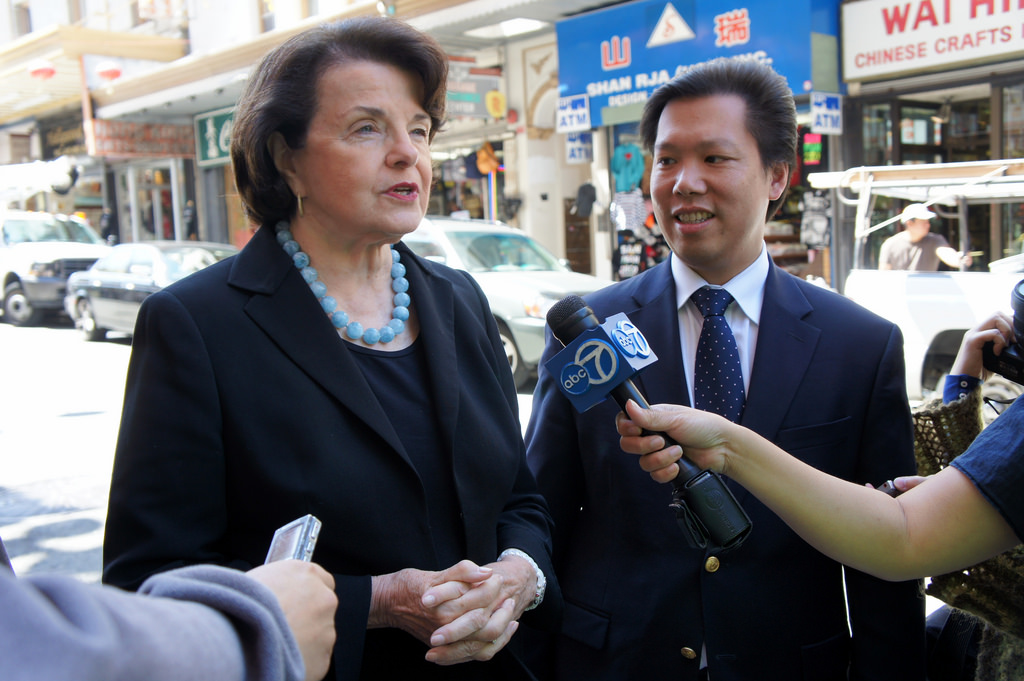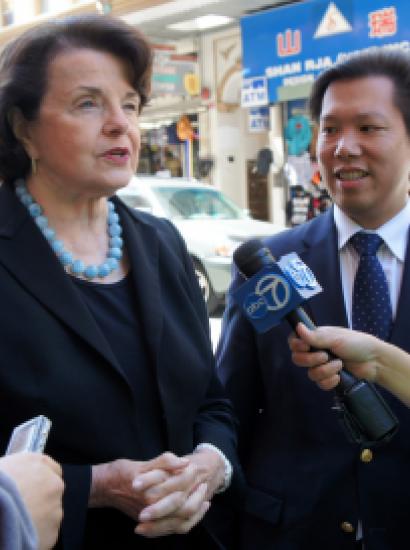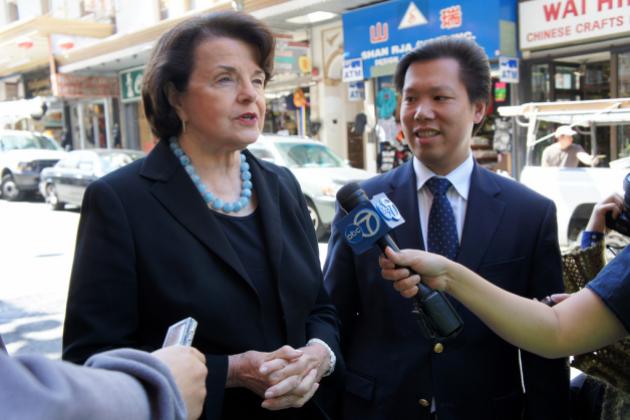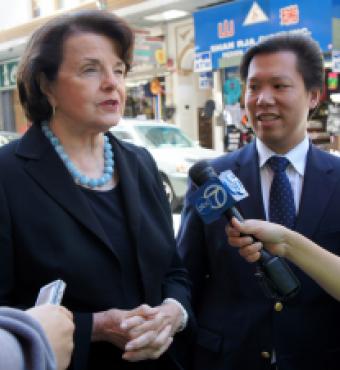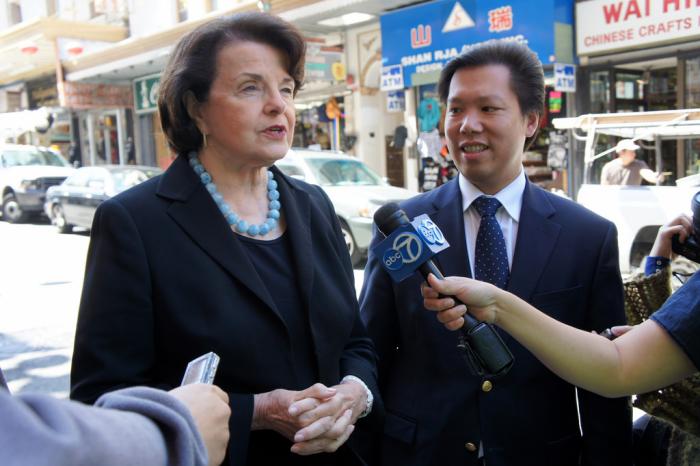- Politics, Institutions, and Public Opinion
- Judiciary
- State & Local
- California
To fully appreciate California Senator Dianne Feinstein’s struggles over the past couple of weeks, start with any photo of the Senate Judiciary Committee that features the trio of Feinstein, committee chair Charles Grassley, and her fellow Democrat Patrick Leahy.
The three senators have served a collective 108 years in the “the greatest deliberative body in the world.” Their combined age of 248 years surpasses that of the United States of America by six years (Feinstein, who turned eighty-five this summer, is the chamber’s oldest senator).
Poster children for change they’re not.
But look closely at most judiciary hearing photos and you’ll see Feinstein literally sandwiched between a rock and a hard place. To one side sits Grassley and committee Republicans determined to push through President Trump’s judicial picks. On the other side, Leahy and committee Democrats committed to trumping the Trump court agenda.
This puts Feinstein in the unenvious position of making enemies most any time she acts on a judicial nominee. When California’s senior senator apologies to Judge Brett Kavanaugh for protestors crashing his Supreme Court confirmation hearing, as she did recently, the left trashes her on Twitter.
When she later releases a letter alleging that Kavanaugh assaulted a fellow teen, the right accuses her of character assassination. Lest you think Feinstein’s out of the woods with progressives, check out this airing of grievances in The Daily Beast.
“Airing of grievances” is, of course, a reference to Festivus, the fictional holiday popularized on television’s Seinfeld. But it’s another Seinfeldian concept that comes to mind when thinking of Dianne Feinstein as Election Day 2018 draws near: leaving on a high note. (“Showmanship, George. When you hit that night note, you say goodnight and walk off.”)
Though she’s likely to breeze to reelection in a few weeks, there’s an argument to be made that 2018 might have been the right time for Dianne Feinstein to have said goodnight and walked off—leaving it to her replacement to deal with the discourteous mess that was once a very civil Senate.
In 1992, the fabled “year of the woman” in US politics, Feinstein and Barbara Boxer each won US Senate races in California. Boxer opted to retire in 2016, giving way to Kamala Harris.
In some regards, Boxer would be right at home in the present Congress. Though only a first-term senator back in the mid-1990s, she made it her mission to take down veteran Oregon Republican Sen. Bob Packwood, who had been accused by nearly twenty women of sexual harassment yet remained in office.
“I’m waiting for the Ethics Committee to kick this guy out and a year goes by, two years go by, still nothing happened,” Boxer complained. She called for public hearings; Republicans blocked the effort. But Boxer’s insistence did re-engage public scrutiny. And once the Ethics Committee came to Packwood’s case, he was booted from the Senate by unanimous acclaim.
The point is: Boxer would thrive in today’s #metoo climate of singling out men behaving badly. But she wouldn’t be the same pioneer that she was twenty-five years ago—more like a choir voice. In retrospect, retirement seems a wise choice.
Feinstein’s role in the Senate is more complicated than that of her former colleague. Unlike Boxer, Feinstein’s built a reputation as a consensus-builder, problem-solver, and the voice of calm.
The problem is, today’s Senate doesn’t allow for calm. Think of it as an Amtrak train without the quiet car.
And a senator who prides herself in accommodation? It’s an awkward fit in today’s California.
Case in point: an August 2017 interview Feinstein gave in San Francisco before a Commonwealth Club audience—ordinarily, a safe harbor for a California Democrat.
In an otherwise friendly night of softball batting practice, Feinstein did something unforgiveable by liberal Bay Area standards: she shrugged off impeaching Donald Trump as the same political cul-de-sac as the failed attempt to end the Clinton presidency (she voted not guilty on both charges)—and dared to suggest Trump might have potential if he changes his stripes.
“This man is going to be president most likely for the rest of this term,” Feinstein told the Commonwealth Club audience. “I just hope he has the ability to learn and to change. And if he does, he can be a good president. And that’s my hope.”
Feinstein’s more moderate past and her state party’s progressive rage during the Trump Era will be front and center in what remains of this election. Her opponent, State Sen. Kevin de León, released this ad last week blasting Feinstein on immigration (De León’s claim to fame in Sacramento: spearheading controversial sanctuary state legislation).
The ad shows Feinstein saying this in 1994: “The illegal immigrants who come here and commit felonies—that’s not what this nation is.”
And this quote from a year prior: “I say return them to their own country, wherever that country may be.”
The ad then shows Trump referring to illegal immigrants as “rapists.”
Not that Feinstein would have voted for Trump, but twenty-five years ago some of her immigration stances would have appealed to the MAGA crowd.
Running for reelection in 1994, Feinstein ran ads claiming her opponent was soft on border control while claiming she had “led the fight to stop illegal immigration.”
That same year, Feinstein proposed an immigration fix that prohibited direct cash assistance (i.e., AFDC, SSI), to immigrants without permanent legal status.
This was Feinstein trying to stake out the political middle—turf she’d occupied ever since she was roundly booed at a Democratic convention appearance in 1990 for her support of capital punishment (a position she renounced in May of this year).
Call it courageous, if you like. But it was also shrewd political radar. Two years after her Daniel-in-the-lion’s-den moment on capital punishment, California performed its first execution in two decades.
That was then; this is now. In 2018, Dianne Feinstein’s no longer ahead of the political curve. Her quest for a fifth term is likely to succeed, but her reputation as the stately consensus-builder has taken a hit in the aftermath of the ugliness that has been the Kavanaugh conformation battle.
So much for finding that high note.







